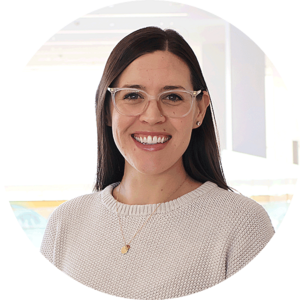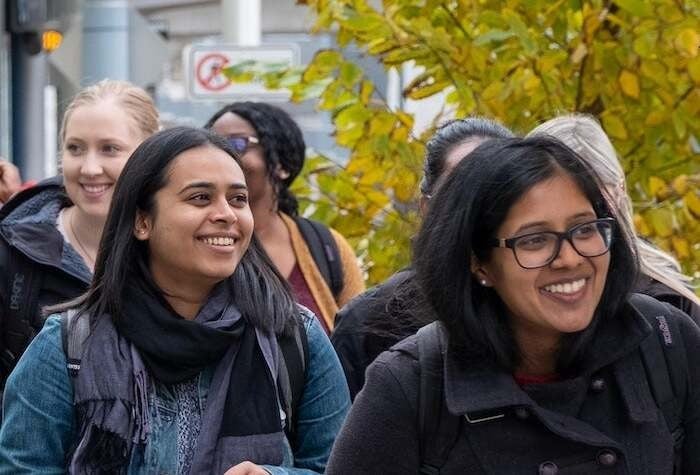Health Sciences degree

Uncover what drives human health
Everybody deserves to be healthy no matter who they are or where they live. Time to level the field.
Taught by researchers and professors who are leaders in their field, you’ll take a “cell to society” approach to human health. Learn how biological and social factors impact everything from cancer to addiction, and from infectious diseases to aging.
Study physiology, biology, chemistry, social determinants of health, epidemiology, and health systems and policy to get the full picture necessary to address health problems big and small.
Throughout your degree, you'll get to work on real-world projects, learn how to analyze health data and research studies, and pursue exciting co-op terms. You can feel confident that what you learn will prepare you for the field. Once you graduate, you’ll be ready to pursue further studies – like medical school or occupational therapy – or jump right into the field in areas like policy analysis, health research, and public health administration.
Studying the many factors that impact our health is crucial – it's not just genetics and biology that determine whether we get sick or live long, healthy lives. In addition to understanding the science behind human health, you’ll learn how taking a proactive approach to health care can save lives before they’re even at risk.
What courses will you take in Health Sciences?
First-year courses
You'll take a mix of courses from the Faculty of Health and the Faculty of Science to give you the foundations in biological and social health and well-being for your upper-year classes.
This is a sample schedule. Courses or when a course is offered may change depending on availability.
After first year
Your upper-year courses in Public Health Sciences will span human health, core sciences, methods and applications, biohealth, ethics, sociology, and more. Dive deeper into the areas that interest you most with ten free electives.
View the courses required for your degree.
Customize your degree in Health Sciences
You can add additional areas of expertise to your degree by including one or more of these areas of focus.
- Minor (10 courses in an area of focus)
-
Addictions, Mental Health, and Policy
-
Gerontology
-
- Option (six to eight courses in an area of focus)
-
Aging Studies
-
Health Informatics
-
-
Specialization (six to nine courses in an area of focus)
-
Health Research
- Pre-Clinical
- Advanced Functions and Physics (or equivalent courses) are recommended if you're interested in this specialization. These courses provide a helpful background but are not required.
-
You can also include one of the minors available to all Waterloo students. Popular minors of interest include Psychology, Human Nutrition, and Neuroscience.
Faculty:
Faculty of Health
Degree:
Bachelor of Science in Health Sciences
Available as a co-op program?
Yes
Available as a regular program?
Yes
Available as a minor?
No
Accredited by the Council on Education for Public Health. This means your degree has gone through a rigorous review to ensure it's current and relevant to what's happening in the world.
Lots of career options. This program can prepare you for medical school — and it can also open many other career pathways like policy analysis, occupational therapy, genetic counselling, research, and more!
Co-op = relevant paid work experience
In the world's leading co-op program, you'll explore potential careers, learn to interview for jobs, graduate with up to two years of valuable experience — and make money!
Sample co-op job titles
- Genetic counselling assistant
- Healthy women project coordinator
- Health promotion assistant
- Patient flow facilitator
- Clinical research assistant
- Health and safety specialist
Co-op work-study sequence
Starting in second year, you'll normally alternate between school and work every four months, integrating your classroom learning with real-world experience. You can return to the same employer for a couple of work terms to gain greater knowledge and responsibility or work for different employers to get a broad range of experience.
| Year | September to December (Fall) | January to April (Winter) | May to August (Spring) |
|---|---|---|---|
| First | Study | Study | Off |
| Second | Study | Co-op | Study |
| Third | Co-op | Study | Co-op |
| Fourth | Study | Co-op | Co-op |
| Fifth | Study | Study | - |
Your first work term will be halfway through second year (January to April 2028).
What can you do with a degree in Health Sciences?
Your degree lays the foundation for a career in health professions such as medicine, clinical research, epidemiology, and occupational health.
Sample careers
- Family Physician — London Lambeth Medical Clinic
- Health Promotion Specialist — Region of Peel
- Tobacco Cessation Specialist — Canadian Cancer Society
- Epidemiologist — University Health Network
- Clinical Research Coordinator — The Centre for Dermatology
- Policy Analyst — Employment Social Development Canada
- Speech-language Pathologist — Peel District School Board
Learn about the future of careers in health and helping professions.
Read profiles and view videos about the path Health Sciences graduates took to pursue their career.
Further education
While the full range of further education depends on your individual interests, these are common areas where graduates pursued a master's, PhD, or other professional program.
- Medicine
- Nursing
- Pharmacy
- Speech language pathology
- Law
- Epidemiology
- Public health
- Health informatics
Considering med school? Learn how you can get into medical school.
Common questions about the Health Sciences program
How is Waterloo’s Health Sciences program different from similar programs at other universities?
In addition to learning how to treat disease, Waterloo’s Health Sciences program also focuses on disease prevention, enabling you to develop effective approaches that keep people healthy. You’ll learn to take a systems approach to disease prevention and treatment, so you can understand how to influence the many factors that affect health.
As a graduate, you’ll be well-prepared for the health-care careers of the future because you’ll be exposed to subjects that will grow increasingly important over the next decade, such as leveraging information technology, understanding the aging population, mental health, and more.
With many small class opportunities like labs and tutorials, over 40 health-related courses to choose from, and experiential learning opportunities like co-op and our EDGE certificate program, you’ll have a distinct advantage when entering the workforce or applying to further studies.
What is the difference between Health Sciences, Biomedical Sciences, Life Sciences, and Public Health?
Health Sciences specifically focuses on human health and well-being.
- It involves studying various aspects of human biology, physiology, and health care. You’ll work to understand human diseases and promote overall health and wellness. You’ll explore topics such as physiology, disease prevention, diagnostics, and patient care.
- You’ll graduate from the Faculty of Health prepared for a career in health professions including medicine, clinical research, epidemiology, and occupational health.
Biomedical Sciences focuses on how the health of humans and animals is impacted by viruses, microbes, bacteria, and genetic and environmental factors.
- In your first year, you’ll establish a foundation in biology, chemistry, physics, and math to prepare for health-related professional schools. Upper-year courses focus on human biology.
- Hands-on lab experience will prepare you for careers in biomedical laboratory research, education, health professions, or industry.
Life Sciences is a broad field that studies living organisms using subjects like biology, zoology, botany, genetics, and ecology.
- At Waterloo, Life Sciences is a group of four potential majors: Biochemistry, Biology, Biomedical Sciences, and Psychology. You’ll delve into one of these topics, all of which combine biology, chemistry, physics, and math.
- You’ll graduate with a Bachelor of Science in your major and the expertise needed for a career in science or further education in a health profession.
Public Health takes a broad perspective on well-being.
- You'll study the social, cultural, political, biological, and geographic factors influencing individual, community, and population health. By considering trends, behaviours, and inequalities in health systems, public health contributes to the well-being of millions. You’ll learn from experts in governments and regulatory bodies and graduate ready to shape health regulations, wearable technologies, and more.
- Graduates often work in community health centres, public health departments, social services agencies, non-profits, and as health consultants, technologists, therapists, analysts, and more.
Does this program meet the prerequisites for medical school and the Medical College Admission Test (MCAT)?
This is a popular option if you plan to pursue medicine. If you’re interested in a future clinical health profession such as medicine, dentistry, and pharmacy, you should consult the requirements for your programs of interest. Between your required and elective courses in the program, you’ll be able to meet the requirements for most medical schools in Canada and around the world. Read our tips on how to get into medical school.
Is this program available online?
No. While you may be able to take some courses online, most courses required for the degree are available through in-person classes only.
How long does it take to complete this program?
It takes four years to complete this program as a full-time student through the regular system of study. You’ll take courses between September and April each year and have your summers off.
You can also choose the co-op system of study where you’ll alternate between four-month school terms and four-month terms in full-time jobs relating to the program. A co-op program takes five years to complete — and you’ll graduate with 20 months of paid work experience.
Admission requirements
Ontario students: six Grade 12 U and/or M courses including
- Any Grade 12 U English (minimum final grade of 70% is required)
- Any Grade 12 U Mathematics (minimum final grade of 70% is required)
- Biology (minimum final grade of 70% is required)
- Chemistry (minimum final grade of 70% is required)
Admission averages
- Regular system of study: Mid-80s
- Co-op: High 80s
Want to be considered for both the co-op and regular systems of study? We recommend that you apply to both streams. With the number of applications we receive for the regular system of study, we can't guarantee that if you're not admitted to the co-op program that you'll be considered for the regular option.
Not studying in Ontario?
Search our admission requirements.
How to apply
Apply directly to this program on your application.
Get information about programs, applying, and more!
Subscribe to our monthly newsletter
Get valuable updates and tips sent straight to your inbox!

Connect with us
Questions about courses, programs, requirements, or careers?
Please contact Clare Stevens, our Faculty of Health recruitment co-ordinator who can answer any questions you have.
From the Missing Manual
Check out our Missing Manual website for tips and advice from Waterloo students and staff.

How to get into medical school
The number medical school applicants outnumbers the spots available. Fortunately, we've got the inside scoop on how to create a stellar application — and what it takes may surprise you!

Showing up for those in need at Lot42
Have you ever visited a safe injection site? Prepared meals for people experiencing homelessness? In the HLTH 448 course, those might be your usual field trips.

Co-op on the front lines of a pandemic
Christina's winter co-op job took her in an unexpected direction — to the front lines of Canada's COVID-19 pandemic response. And that experience has set her on a new career path.